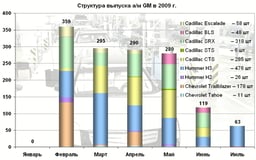Chevrolet TrailBlazer
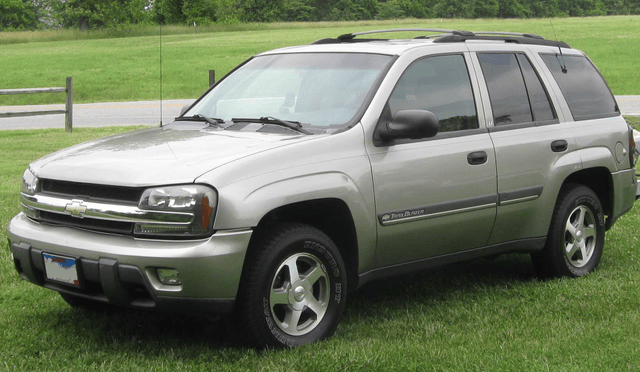
Chevrolet TrailBlazer

| Chevrolet TrailBlazer | |
|---|---|
| Overview | |
| Manufacturer | Chevrolet(General Motors) |
| Production | |
| Body and chassis | |
| Class | |
| Body style | 5-door SUV |
| Layout | |
| Chronology | |
| Predecessor | Chevrolet S-10 Blazer |
| Successor | Chevrolet Traverse(North America)Chevrolet Equinox(for first generation) |
| First generation | |
| Overview | |
| Production | 2001–2008 |
| Model years | 2002–2009 (US and Canada only) |
| Assembly | |
| Designer | Bill Davis[4] |
| Body and chassis | |
| Platform | GMT360/GMT370 (EXT) |
| Related | |
| Powertrain | |
| Engine | |
| Power output | |
| Transmission | |
| Dimensions | |
| Wheelbase | |
| Length | |
| Width | 1,897 mm (74.7 in) |
| Height | |
| Chronology | |
| Successor | Chevrolet Traverse(North America) |
| Second generation | |
| Overview | |
| Also called | |
| Production | 2012–present |
| Assembly | |
| Body and chassis | |
| Platform | GMT31XX |
| Related | |
| Powertrain | |
| Engine | |
| Power output | |
| Transmission | |
| Dimensions | |
| Wheelbase | 2,845 mm (112.0 in) |
| Length | 4,887–4,952 mm (192.4–195.0 in) |
| Width | 2,132 mm (83.9 in) |
| Height | 1,848–1,852 mm (72.8–72.9 in) |
The Chevrolet TrailBlazer is an automobile nameplate used by Chevrolet, a division of General Motors for their lineup of SUVs. The nameplate was first used as a mid-size SUV that was sold from 2001 to 2009 for the North American market. It was replaced by the introduction of the Traverse in 2009. In 2012, a production of a newly redesigned version of the TrailBlazer for Asia and Brazil began.
| Chevrolet TrailBlazer | |
|---|---|
| Overview | |
| Manufacturer | Chevrolet(General Motors) |
| Production | |
| Body and chassis | |
| Class | |
| Body style | 5-door SUV |
| Layout | |
| Chronology | |
| Predecessor | Chevrolet S-10 Blazer |
| Successor | Chevrolet Traverse(North America)Chevrolet Equinox(for first generation) |
| First generation | |
| Overview | |
| Production | 2001–2008 |
| Model years | 2002–2009 (US and Canada only) |
| Assembly | |
| Designer | Bill Davis[4] |
| Body and chassis | |
| Platform | GMT360/GMT370 (EXT) |
| Related | |
| Powertrain | |
| Engine | |
| Power output | |
| Transmission | |
| Dimensions | |
| Wheelbase | |
| Length | |
| Width | 1,897 mm (74.7 in) |
| Height | |
| Chronology | |
| Successor | Chevrolet Traverse(North America) |
| Second generation | |
| Overview | |
| Also called | |
| Production | 2012–present |
| Assembly | |
| Body and chassis | |
| Platform | GMT31XX |
| Related | |
| Powertrain | |
| Engine | |
| Power output | |
| Transmission | |
| Dimensions | |
| Wheelbase | 2,845 mm (112.0 in) |
| Length | 4,887–4,952 mm (192.4–195.0 in) |
| Width | 2,132 mm (83.9 in) |
| Height | 1,848–1,852 mm (72.8–72.9 in) |
Blazer trim line (1999–2001)
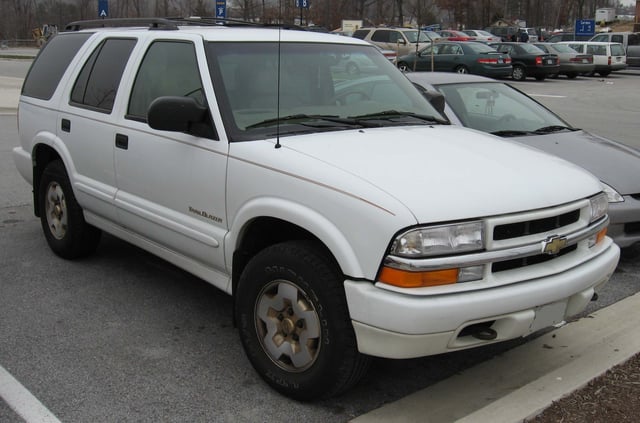
1999–2001 Chevrolet Blazer TrailBlazer
The TrailBlazer name was first introduced for the 1999 model year as an upscale trim level of the compact 4-door Chevrolet S-10 Blazer. It offered additional features on top of the previously top-of-the-line Chevrolet S-10 Blazer LT trim level, including an A/M-F/M stereo with single-disc CD player and optional remote cassette player, OnStar, color-keyed front and rear bumpers, side cladding, and front grille, a leather-wrapped steering wheel with cruise control, upgraded alloy wheels, a full-size spare tire and wheel, and upgraded cloth seating surfaces with power front bucket seats. Options such as a Bose premium audio system, leather-trimmed seating surfaces with front seat heating, premium alloy wheels, a power sunroof, and gold accents for the exterior emblems and alloy wheels were all available for the TrailBlazer. While the TrailBlazer trim level was discontinued after 2001 when the all-new, mid-size 2002 TrailBlazer was introduced, production of the standard compact Chevrolet S-10 Blazer overlapped until the 2005 model year, when it was finally replaced by the Chevrolet Equinox in the U.S..
First generation (2001–2009)
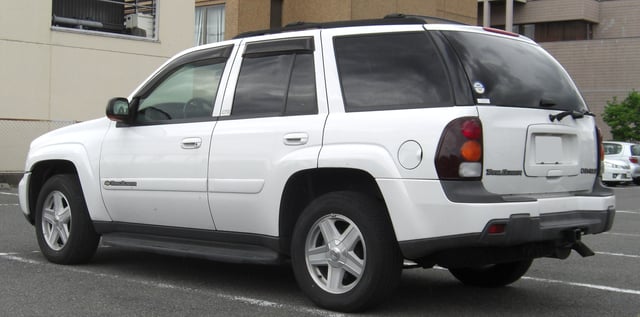
2002–2005 Chevrolet TrailBlazer, with modification to meet Japanese standards.
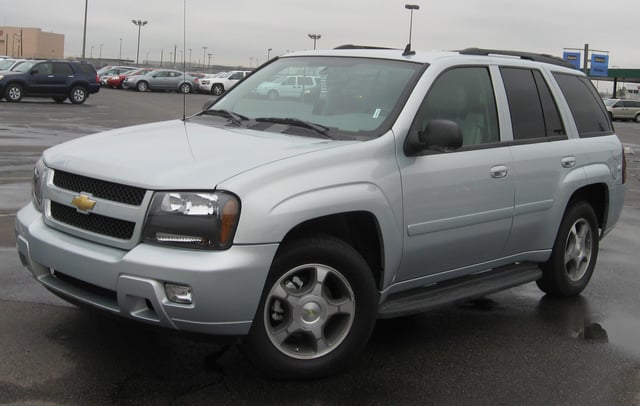
2006–2008 Chevrolet TrailBlazer LT
The first generation 2002–2005 TrailBlazer is based on a truck platform called GMT360, with all models having four-wheel-drive layout as an option with both automatic engagement and the more traditional "2 High", "4 High" and "4 Low" gearings, except the SS model which features an all-wheel-drive system. The TrailBlazer features an independent front suspension, and a five-link rear suspension. A G80 locking rear differential is available as an option on all models except for the SS which has a G86 LSD standard. An LTZ version, has upgraded interior features (leather), better sound system (Bose), and alloy wheels. All TrailBlazers came factory equipped with a detachable towing hitch.
The TrailBlazer was updated in 2005 for the 2006 model year.
An updated front fascia on models higher than the base version and new interior trim were included with the refresh.
The SS gets trim-specific front and rear fascias plus color-matched side skirts.
Engines
The TrailBlazer comes with an all-aluminum 4.2 L Atlas LL8 inline-six engine that produces 203.5 kW (273 hp; 277 PS) and 376 N⋅m (277 lb⋅ft) of torque as standard, or an optional aluminum small-block 5.3 L V8 engine that produces 225 kW (302 hp; 306 PS) and 447 N⋅m (330 lb⋅ft) of torque with Active Fuel Management. The inline-six engine option makes the TrailBlazer the most powerful six-cylinder SUV in its class. The Active Fuel Management system on the V8 engine shuts off 4 of the 8 cylinders during highway travel and idle to save fuel. The inline-six versions of the TrailBlazer get up to 20 miles per US gallon (12 L/100 km; 24 mpg‑imp) on highway, according to refreshed United States Environmental Protection Agency estimates.
The TrailBlazer won the North American Truck of the Year award in 2002. The 4.2 L engine appeared on the Ward's 10 Best Engines list from 2002–2005 with innovative features such as DOHC, variable valve timing on the exhaust camshaft and GM's patented lost-foam casting process.
2002–2009 LL8 4.2 L I6
2003–2004 LM4 5.3 L V8
2005–2009 LH6
2006–2009 LS2
Trim Levels
Throughout its production run, the TrailBlazer was available in several different trim levels:
The LS was the base trim level of the TrailBlazer, and included a plentiful amount of standard equipment, including aluminum-alloy wheels, four wheel disc brakes, the 4.2L Vortec Inline Six-Cylinder (I6) gasoline engine, a four-speed automatic transmission, cloth seating surfaces, a full-size, matching spare tire with black-painted steel spare wheel, an A/M-F/M stereo with single-disc CD player, a four-speaker audio system, power windows, door locks, and mirrors, keyless entry, a 65/35 split-folding rear bench seat, cruise control and a Driver's Information Center. Optional features included a combination cassette and single-disc CD player or a six-disc CD player, a power front driver's seat, a security system, satellite radio (later models) and OnStar.
The LT was the midlevel trim of the TrailBlazer, and added further convenience items to the base LS trim, including upgraded aluminum-alloy wheels, a power front driver's seat, a security system, and a leather-wrapped steering wheel. Optional features included a Bose six-speaker premium amplified audio system, a combination cassette and single-disc CD player or a six-disc, in-dash CD changer, luxury leather-trimmed seating surfaces, dual heated front bucket seats, a power front passenger's seat, a driver's memory system for front driver's seat, mirrors, and radio preset settings, a power moonroof, a rear DVD entertainment system by Panasonic (newer models), polished aluminum-alloy wheels, OnStar, a touchscreen GPS navigational radio (later models), and a universal garage door opener system with travel note recorder.
The LTZ was the top-of-the-line trim level of the TrailBlazer, and added further luxury features to the already well-equipped LT trim, including a Bose six-speaker premium amplified audio system, a six-disc, in-dash CD changer, luxury leather-trimmed seating surfaces, dual heated front bucket seats, OnStar, a universal garage door opener system with travel note recorder, a power moonroof, and upgraded interior trim. Additional options included polished aluminum-alloy wheels, a touchscreen GPS navigational radio (later models) and a rear DVD entertainment system by Panasonic.
The SS, introduced for the 2006 model year, was the performance-oriented model of the TrailBlazer, and was based on either the LT or LTZ trim, depending on the equipment package selected (see the specific models above for standard and optional equipment, which is identical to those trim levels). The differences included unique interior trim, unique polished aluminum-alloy wheels, an unique leather-wrapped steering wheel with an "SS" center emblem, "SS" emblems on the polished wheel center caps, "SS" embroidery for both front bucket seats, unique premium cloth or luxury leather-trimmed seating surfaces, and a 6.0L V8 gasoline engine taken from the Chevrolet Corvette (C6).
EXT
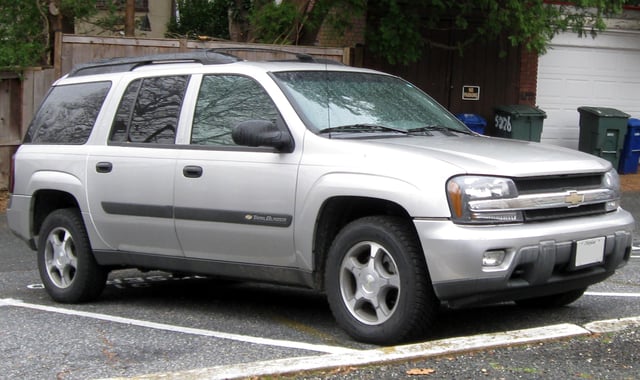
2003–2005 Chevrolet TrailBlazer EXT
The TrailBlazer was also available as a 3-row, 7-passenger EXT version.
This vehicle was 410 mm (16 in) longer and had a higher roofline to allow easier access to the third row of seats.
This roof was disguised by standard roof racks.
The TrailBlazer EXT platform was given the internal designation GMT370, which was shared with the GMC Envoy XL and Isuzu Ascender LWB; long wheelbase versions of the Oldsmobile Bravada, Buick Rainier and Saab 9-7X were never offered.
Production of the EXT model was handled by the Oklahoma City Assembly plant in Oklahoma City, Oklahoma. The last TrailBlazer EXT rolled off the assembly line on February 20, 2006, because GM had reportedly closed that plant, making 2006 the final year for the TrailBlazer EXT.
The EXT could be identified by its much straighter rear doors (which were not inline with the rear wheel arches), as well as by the circular, metal cap on each of the quarter windows where the opening mechanism attaches, on the 2003 models only.
SS
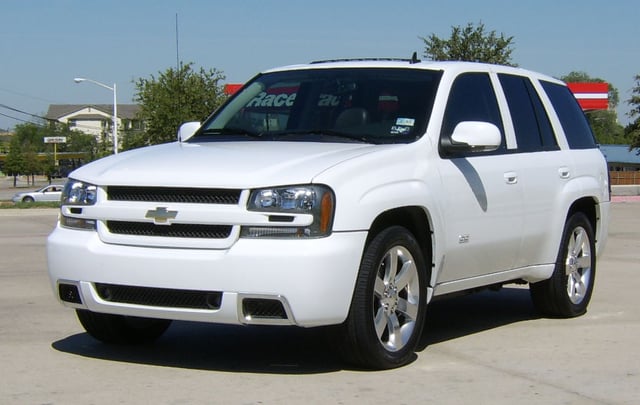
2006 Chevrolet TrailBlazer SS
An SS model was introduced for the 2006 model year.
This was the first time a production SUV wore the Super Sport badge.[6] The TrailBlazer SS came standard with a 6.0 L LS2 V8 engine, the same engine that came standard in the 2005–2007 C6 Corvette, with different exhaust (more restrictive) and a taller intake that better utilized the torque characteristics of the engine in the heavier body. The suspension was stiffened up and lowered from the factory, it had an added air-leveling system in the rear, and it rode on 20 in (510 mm) wheels and 255 mm (10.0 in) wide tires — all which contributed to much improved handling. All TrailBlazer SS also came from the factory with 4.10 differentials, improving off-the-line acceleration. They were available in both rear-wheel-drive and all-wheel-drive configurations. About 1.7% of total TrailBlazer production had the B4U SS-package.
| Calendar Year | Total TrailBlazer SS Sales |
|---|---|
| 2006 | 9,361 |
| 2007 | 10,726 |
| 2008 | 5,744 |
| 2009 | 610 |
Safety
IIHS tests in early 2009 gave early TrailBlazers a Acceptable[7] overall rating in the frontal offset test while 2005–2009 models got an Acceptable rating. For 2008 models side curtain airbags became standard. At that time, the TrailBlazer received a Marginal overall side impact rating - tested with optional side airbags present. Torso type side airbags were not available then.[8]
2007 National Highway Traffic Safety Administration (NHTSA) Crash Test Ratings:[9]
Frontal Driver:
Frontal Passenger:
Side Driver:
Side Rear Passenger:
Rollover 2wd:
Rollover 4wd:
Yearly American sales
Discontinuation
The next generation TrailBlazer was to be built on an upgraded version of the current GMT360 platform called the GMT361.
It was scheduled to be launched in spring 2007, but in January 2006, GM decided to just refresh the current platform and call the vehicle a GMT360NG.
However, in June 2006, GM announced that the GMT360NG program was also canceled due to the large investment.
GM decided to keep the current TrailBlazer until the 2009 model year (2008 in Mexico).
Buick instead got the Enclave, a GM Lambda platform-based crossover SUV to replace the Rainier (along with the Rendezvous and the Terraza minivan), while GMC got the GM Theta platform-based crossover SUV Terrain to replace the Envoy. Saab replaced the 9-7X with the Cadillac SRX-based 9-4X, which was discontinued soon after its introduction in 2011.
The TrailBlazer, along with the Uplander minivan, were replaced by the Traverse. GM had closed the Moraine plant on December 23, 2008, ending production of all GMT360 products.[14] The last TrailBlazer rolled off the Moraine line on December 16, 2008, a week before the plant's closure. The closing of the last factory that manufactured the trucks was the subject of a 2009 HBO documentary The Last Truck: Closing of a GM Plant.[15]
Recall
In 2012, General Motors and Isuzu recalled more than 258,000 SUVs in the U.S. and Canada to fix short-circuits in power window and door lock switches that could cause fires. The recall covered TrailBlazer, Envoy, Rainier, Ascender and 9-7X SUVs from the 2006 and 2007 model years. The SUVs were sold or registered in 20 U.S. states, Washington, D.C., and Canada, where salt and other chemicals are used to clear roads in the winter.[16]
Second generation (RG; 2012–present)
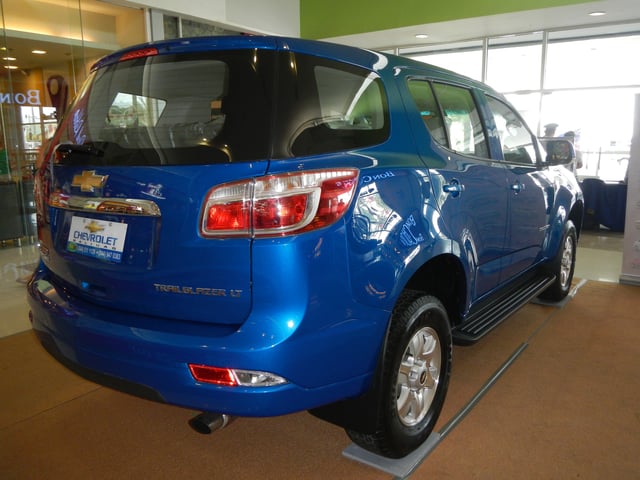
Rear quarter view
The second generation TrailBlazer was unveiled as a concept at the 2011 Dubai Motor Show, and as a production model at the Bangkok Motor Show on March 21, 2012.[17] As is the case with the original K5 Blazer (1969–1994), Tahoe (since 1995), Suburban (since 1935) and S-10 Blazer (1983–2005), the second-generation TrailBlazer is based on a truck frame, namely the second generation Colorado.
The second generation TrailBlazer is built in Thailand and in Brazil.[18] It is currently being sold in some of the Southeast Asian countries, India, South Africa, Saudi Arabia and sold in Australia as the Holden Colorado 7 from 2013 to 2016, and being rebadged as the TrailBlazer in 2017.
The Isuzu MU-X also resembles the second generation TrailBlazer.[19]
Engines
The second generation TrailBlazer comes with three engine options, two of them are diesels, one featuring a Duramax 2.5 L that produces 110–132.5 kW (148–178 hp; 150–180 PS) and 350–440 N⋅m (260–320 lb⋅ft) of torque as standard, and an optional Duramax 2.8 L that produces 132.5–147 kW (178–197 hp; 180–200 PS) and 470–500 N⋅m (350–370 lb⋅ft) of torque. For the Brazilian, South African and Saudi markets, the 3.6 L V6 gasoline engine option that produces 178 kW (239 hp; 242 PS) (in Brazilian market, the 2015 version producing 208 kW (279 hp; 283 PS)) and 360 N⋅m (270 lb⋅ft) of torque is also available.
The 2.8 L diesel engine have several new parts, namely a new water-cooled variable-geometry turbocharger, a new high-pressure common-rail fuel delivery system, a new exhaust gas recirculation (EGR) system, a new intake manifold, a new cylinder head, a new cylinder block, a new balance shaft unit and a new Engine Control Module (ECM).[20]
Holden Colorado 7/TrailBlazer
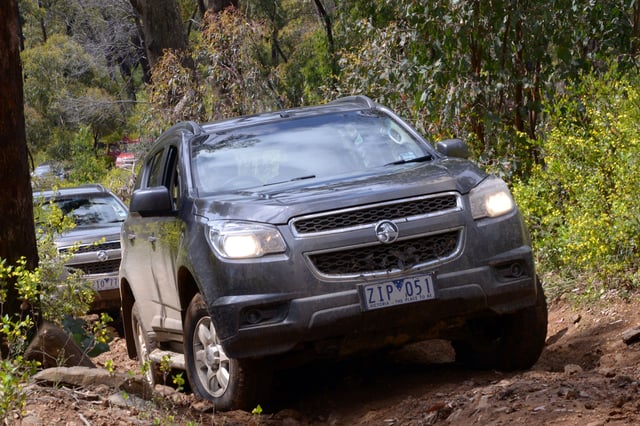
Holden Colorado 7
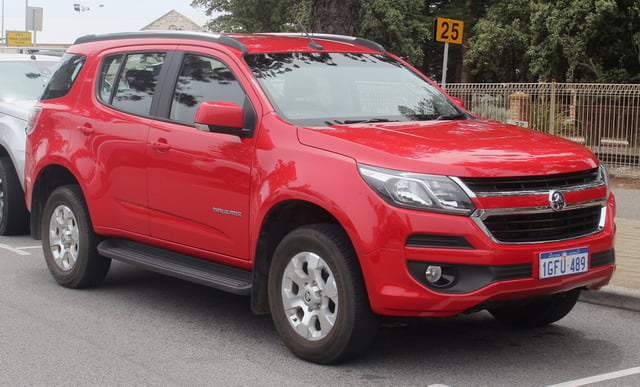
2017 Holden Trailblazer
Launched in late 2012, the Holden Colorado 7, like the Trailblazer, is based on the same under pinnings as the regular Colorado, however bodywork from the A-pillar back is entirely different. Instead the Colorado 7 takes on the form of a large SUV with an enclosed roof, tailgate and 7-seats. The Colorado 7 is powered by the same VM Motori 2.8 L turbodiesel engine and unlike the Colorado, the rear suspension is a five-link system connected to coil springs but retains the live axle.[21]
The range consists of two trim levels; LT and LTZ.
Standard equipment for all Colorado 7s includes cruise control, body-coloured bumpers, side steps, front fog lights, aluminium roof rails, rear parking sensors (in addition to the rear camera), Bluetooth phone connectivity, USB input, roof mounted climate control vents for second and third rows and a leather-wrapped steering wheel with multifunction controls.
The LTZ adds 18-inch wheels, projector headlights, exterior chrome highlights, leather seats, a premium sounds system, a six-way adjustable driver’s seat, higher grade interior trim elements and LED tail-lights.[21]
At its first model update in 2016, the Colorado 7 was renamed to TrailBlazer.[22]
